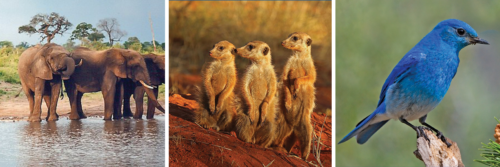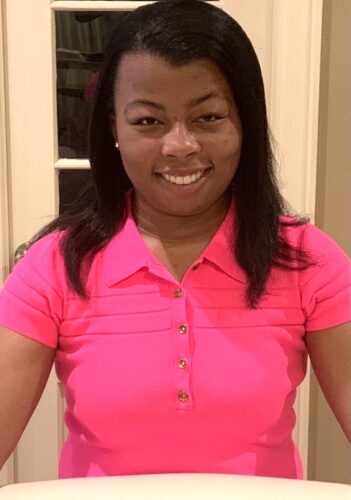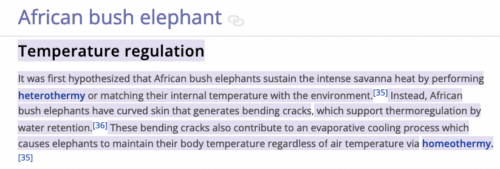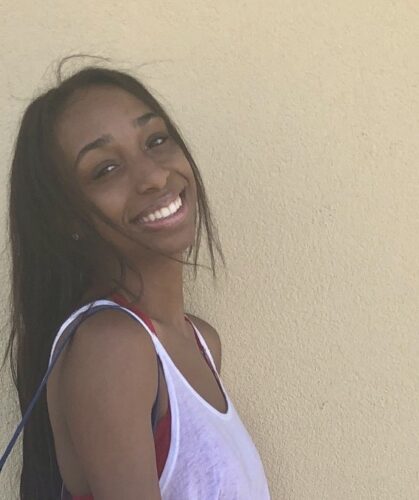Courtney Hall, Mary Strecker, and Rachael Ballou all took Christine Lattin’s Environmental Physiology course last term. They dove into how species survive in their environments, deal with common problems, and adapt to extreme conditions–from deserts to the deep seas. Then they took what they learned and they shared it with the world. That is, the world of Wikipedia.
Courtney, Mary, and Rachael each began researching a particular animal whose Wikipedia article they would improve by the end of the term. Courtney chose the African bush elephant, Mary the meerkat, and Rachael the mountain bluebird. To update the corresponding articles on Wikipedia, they had to understand the current scientific consensus on the animal’s survival and adaptation strategies. Into the literature they went!

“My experience with the Wikipedia assignment has helped me to be able to read a scientific article and not get lost in what the article is discussing but rather understand what the article is addressing and why,” Rachael shares.
Grasping this greater context is what the Wikipedia assignment is all about. How does one topic relate to another? What does the field at large say? What’s missing on Wikipedia?
“You must make sure that the information you are placing together is accurate and concise,” Courtney adds. “This assignment taught me the importance of fully understanding what you are reading. If you don’t understand something, you’re more than likely going to misinterpret it.”
What was missing from Wikipedia?

Once students have a deep enough understanding of their topic, they can begin to evaluate Wikipedia’s coverage of it and discover gaps to fill.
“There were considerable gaps in the African bush elephant article,” Courtney says. “There was a lot of information missing pertaining to its behavior and adaptations. I was very surprised by this because Wikipedia articles pertaining to animals usually have copious amounts of information on them.” So Courtney added a whole section on how the elephants regulate their body temperature.

Mary, on the other hand, saw that she could expand information related to the threats that meerkats face. “The threats and conservation section noted that a lack of rainfall was the only major threat facing meerkats; however, a quick survey of the scientific literature reveals that heat waves associated with climate change have a significant negative impact on meerkat health and survival.” So she added that.

Rachael noticed omissions in the article about the mountain bluebird, too. While the article talked about how deforestation and agriculture affect populations, other human-caused factors weren’t there.
“Deforestation and agricultural practices are most likely to be mentioned as human caused factors resulting in the decline of bird populations,” says Rachael. “I wanted to add insight on other types of human impacts on mountain bluebird populations. I hope that readers will understand that the two causes mentioned above are not the only ways that humans can affect mountain bluebird populations and that when working to conserve a species, even factors that are not normally mentioned should be considered.”

Bolstering student scientific literacy and career relevant skills
The students not only grasped the scientific consensus around their topic, they also practiced distilling that information for a general audience. All three students connected these skills to a future career when discussing the benefits of the assignment.
“When writing articles in Wikipedia, the author should be able to critically evaluate scientific literature and restate the main theses clearly for a general audience,” Mary notes. “These skills are applicable to many future careers in science, including public outreach, consulting, and education.”
Rachael, a biological sciences major hoping to pursue a career in the field of medicine, adds:
“Writing this Wikipedia article has taught me to be organized, concise, and short in my writing. This will be very helpful to me as I continue my career because applications, summaries, and research papers all call upon these skills. In order for me to be successful in my career, I must be able to do these three things correctly.”
Courtney also plans to apply these new skills to her career, which she’s pursuing now that she has graduated with a biological sciences degree and a pre-med concentration. “This assignment also taught me how to synthesize pages of information into a concise matter. As a future physician, I may have to present findings to patients or colleagues. To get my point across, I need to make sure that I state the ‘meat’ or main ideas without being wordy.”
Impacting public perception
When writing for Wikipedia, students have a lot of power to impact how the public sees their topic, and they take great responsibility in the task. Many people read these particular articles every day: 150 visits a day for the mountain bluebird article, 1,000 for the African bush elephant, and 1,300 for the meerkat. That means that since November, 16K have read Rachael’s work, 170K have read Courtney’s work, and 183K people have read Mary’s work.
“Since the African bush elephant page has such a high volume of visitors, I wanted to make sure that what I added would be valuable to the page,” Courtney shares. “I also wanted to avoid being repetitive but stayed concise and accurate. I hope that readers will gain more insight about this animal and perform additional research. I also wanted readers to look at the sources linked in the paragraph to get a full grasp on the concept of just how beneficial these skin folds are.”
“I wanted to ensure that the article was up to date with the latest research on the threats facing meerkat conservation,” Mary adds. “I hope readers that may be casually seeking information about this charismatic species will gain an understanding of the far-reaching, and perhaps unexpected, impacts of climate change.”
Sharing science outside the academy

“I do think it is important to communicate science through Wikipedia because Wikipedia is a resource that everyone can have access to, it is easy to use, and most importantly, it is free,” says Rachael. “If someone wants to be educated about a particular topic, then they should be able to do so, and Wikipedia is a great resource for that.”
Mary agrees that Wikipedia is an important avenue for science communication. “Wikipedia is often the first stop when seeking information online, and as scientific literacy is unfortunately a low priority in many American educational systems, Wikipedia articles provide a unique opportunity to present science to curious readers in an accessible, non-intimidating format.”
“Before doing deep research people usually perform a quick Google search on a topic,” Courtney also notes. “Wikipedia is one of the top websites that pop up. When you skim a Wikipedia article, you can see what the key points are to a specific topic. Most of the time, these key points are hyperlinked to strong sources. In addition, Wikipedia articles may introduce scientific topics that readers are not aware of. After viewing the article, one can perform additional research and gain even more knowledge on a scientific topic.”
Gratitude for the Wikipedia assignment
“My professor at LSU, Dr. Christine Lattin, dedicated a lot of time and effort to making the Wikipedia project a success,” says Mary. “Through this project, we learned how to locate relevant scientific research, analyze scholarly articles, and communicate our findings effectively.”
“This assignment really changed my perspective on Wikipedia,” Courtney notes. “When I was in grade school, my teachers always taught us to avoid Wikipedia because ‘anyone can type anything they want.’ I learned very quickly that it’s very difficult to do this on Wikipedia. There are so many steps and editors involved in a simple post to avoid things like this from happening. I really would like to thank my teacher Dr. Christine Lattin for giving our class this assignment.”
“Before taking Dr. Lattin’s class, scientific articles were intimidating to me,” says Rachael. “After the exercises she had us do in class of breaking down these articles into digestible parts, I gained a better understanding of how to identify what the authors were addressing and why. I sincerely want to thank Dr. Lattin for this assignment and for the skills I have acquired in her class because I now have a spring in my step towards approaching scientific articles and analyzing them.”
Learn more about incorporating a Wikipedia assignment into your course of any discipline at teach.wikiedu.org.
